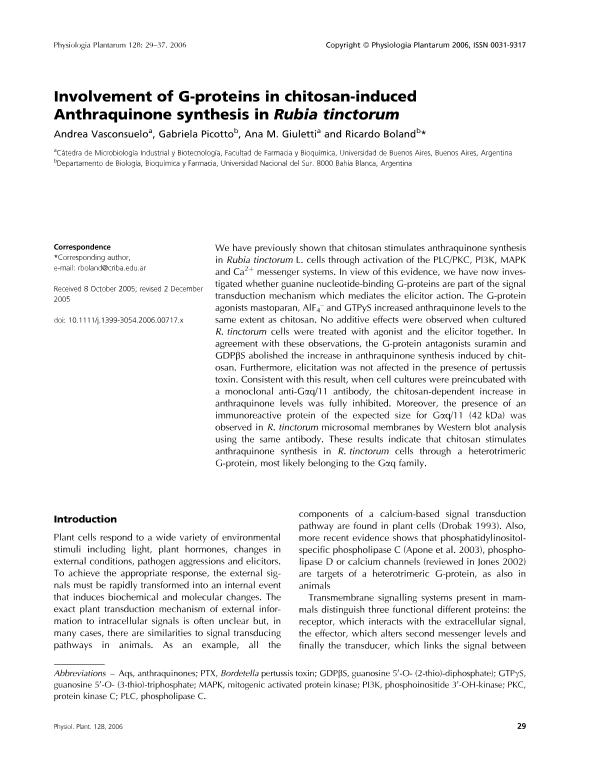Artículo
Involvement of G‐proteins in chitosan‐induced Anthraquinone synthesis in Rubia tinctorum
Fecha de publicación:
12/2006
Editorial:
Wiley Blackwell Publishing, Inc
Revista:
Physiologia Plantarum
ISSN:
0031-9317
e-ISSN:
1399-3054
Idioma:
Inglés
Tipo de recurso:
Artículo publicado
Clasificación temática:
Resumen
Elicitation with chitosan (200 mg/l) significantly stimulates (100%) anthraquinone (Aq) synthesis in Rubia tinctorum L. cultures, but the mechanism of elicitation is largely unknown.We recently showed that the effects of the elicitor involve phospholipase C (PLC), protein kinase C (PKC), phosphoinositide 3-kinase (PI3K) and mitogen activated protein kinase (MAPK) cascades. Here, we show that the elicitor action on Aq production can be blocked with the intracellular Ca2+ chelator BAPTA-AM but not in a Ca2+-free medium (+EGTA) or in the presence of the voltage-dependent Ca2+ channel antagonists verapamil and nifedipine. In agreement with these observations, spectrofluorimetric measurements in Fura 2-loaded R. tinctorum cells show that chitosan increases intracellular Ca2+ concentration in a medium devoid of calcium. Short treatment intervals (1?5 min) of cells with the elicitor significantly increased DAG and IP3 formation. Moreover, the PI-PLC inhibitors neomycin and U73122 diminished to a great extent chitosan-induced Aq synthesis. Blockers of Ca2+ release from inner stores such as 2-APB, TMB-8, caffeine, ruthenium red and dantrolene inhibited elicitation. Chitosan rapidly stimulated (phosphorylated) MAPK. This effect was significantly decreased by the calcium modulators used above. However, EGTA did not prevent activation of MAPK. Compound LY24009, a blocker of PI3K, inhibited MAPK phosphorylation by chitosan. Accordingly, an increase in PI3K activity was observed in parallel. The results of this study show that chitosan induction of anthraquinone synthesis in R. tinctorum involves the stimulation of PLC, intracellular Ca2+ mobilization and PI3K, which mediate MAPK activation.
Palabras clave:
Rubia Tinctorum L
,
Protein G
,
Anthraquinone
,
Chitosan
Archivos asociados
Licencia
Identificadores
Colecciones
Articulos(CCT - BAHIA BLANCA)
Articulos de CTRO.CIENTIFICO TECNOL.CONICET - BAHIA BLANCA
Articulos de CTRO.CIENTIFICO TECNOL.CONICET - BAHIA BLANCA
Articulos(INICSA)
Articulos de INSTITUTO DE INVESTIGACIONES EN CIENCIAS DE LA SALUD
Articulos de INSTITUTO DE INVESTIGACIONES EN CIENCIAS DE LA SALUD
Articulos(OCA HOUSSAY)
Articulos de OFICINA DE COORDINACION ADMINISTRATIVA HOUSSAY
Articulos de OFICINA DE COORDINACION ADMINISTRATIVA HOUSSAY
Citación
Vasconsuelo, Andrea Anahi; Picotto, Gabriela; Giuletti, Ana M.; Boland, Ricardo Leopoldo; Involvement of G‐proteins in chitosan‐induced Anthraquinone synthesis in Rubia tinctorum; Wiley Blackwell Publishing, Inc; Physiologia Plantarum; 128; 12-2006; 29-37
Compartir
Altmétricas




